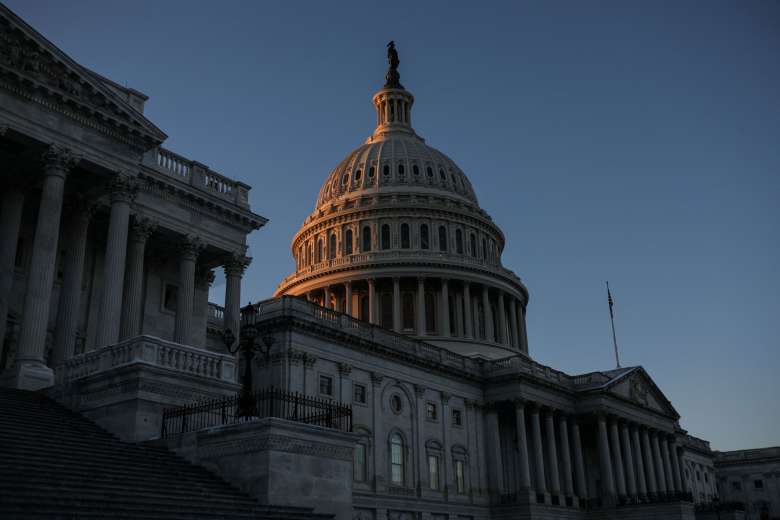Why November could decide Senate control for years
USA
For Senate Democrats, 2024 is the year of living dangerously.
In this fall’s Senate elections, Democrats will be defending more seats in precarious political terrain than in any other election during the 2020s. That list of challenging elections this year includes the final three Senate seats Democrats hold in states that voted for Donald Trump in 2020, and five more in states that President Joe Biden won by 3 percentage points or less. Meanwhile, Republicans this year are not defending any Senate seats in states that voted against Trump in 2020, or preferred him by 3 points or less.
That math underlines the stakes for Democrats in Biden improving his position in the key swing states by November. One of the most powerful trends of modern Senate elections is that it has become exceedingly difficult for candidates in either party to win seats in states that usually vote the other way for president.
The Senate Democrats running in difficult electoral terrain might break that trend this fall. Yet if they can’t, Biden’s fate in November could determine control of the Senate not only in 2025, but for years thereafter.
A strong recovery by Biden in which he wins most of the key swing states could position Democrats to remain competitive in the battle for Senate control through the remainder of this decade, even if they narrowly lose the majority in November. But if Biden loses most of the swing states, Democrats could fall into a Senate deficit too large to realistically overcome for years — especially because the party has so few plausible opportunities to flip seats now held by the GOP.
“If the bottom were to drop out for Biden, Democrats could lose the Senate for a long time,” said Kyle Kondik, managing editor of the political newsletter “Sabato’s Crystal Ball,” which is published by the University of Virginia’s Center for Politics.
That prospect has enormous implications not only for the passage of legislation but also for the composition of the federal courts, especially the Supreme Court. Four of the Supreme Court justices will be older than 70 by 2028. Even if Biden holds the White House in 2024, and a vacancy arises, a durable Republican Senate majority might refuse to fill any of those seats — just as then-Majority Leader Mitch McConnell did while Barack Obama was president in 2016. “You can imagine Supreme Court seats going unfilled for years,” Kondik said.
The default position for the Senate in the 21st century has been for small and fleeting majorities. In the 12 congressional sessions since 2001, one party or the other has reached 55 Senate seats only three times. By comparison, one party or the other won a majority of 55 or more Senate seats seven times in the 10 sessions from 1980 to 2000. Smaller majorities, not surprisingly, have proved more difficult to defend: In this century, control of the Senate has already flipped in the elections of 2002, 2006, 2014 and 2020.
The principal reason the chamber has become so closely divided is the growing correlation between how states vote for president and how they vote for the Senate. That has limited the number of Senate seats each side can win absent unusual circumstances.
Through the late 20th century, it was common for voters to split their tickets by electing senators from one party while voting for the presidential nominee of the other. After the 1984 election, for instance, Democrats still held about half the Senate seats in the states that voted for Ronald Reagan in both of his winning presidential campaigns.
But now the alignment between presidential and Senate outcomes has become nearly complete. Heading into the 2024 election, Republicans hold 47 of the 50 Senate seats in the 25 states that voted for Trump in 2020. Democrats, in turn, hold 48 of the 50 Senate seats in the 25 states that voted for Biden last time.
This surface equivalence in the two parties’ position in the Senate, though, masks a deeper divergence that largely explains the risk to Democrats this year.
While Biden and Trump each won 25 states in 2020, Biden won far more of them by very narrow margins. As a result, Senate Democrats are much more dependent than Republicans on states that lean their way only slightly in the presidential contest.
In 2020, Biden won three states by less than a single percentage point: Arizona, Georgia and Wisconsin. He won three others by less than 3 percentage points: Pennsylvania, Nevada and Michigan. Democrats now hold 11 of the 12 Senate seats from those six highly competitive states. (Ron Johnson of Wisconsin is the only Republican senator from these states.)
By contrast, among the 25 states that backed Trump, North Carolina — where Republicans hold both Senate seats — was the only one Trump carried by less than 3 percentage points. Even extending the net to states Trump won by less than 5 percentage points brings in only Florida, where Republicans also hold both Senate seats.
This contrast creates a huge disparity between the parties. Democrats now hold 14 inherently vulnerable Senate seats: their three from the states Trump won in 2020, and their 11 in the states Biden won only narrowly. For Republicans the total is at most six: two in states that Biden won in 2020, and four in states that Trump won narrowly, even with Florida included.
“When you have so many states where it is now inconceivable that they could go the other way, Democrats always have to get a straight flush,” said Michael Podhorzer, the former political director for the AFL-CIO. “They’ve got to run the table, because on the basis of what’s safe on either side in the Senate, or the Electoral College, they are at a huge disadvantage.”
This year Democrats are defending five of their 11 seats in the states that Biden won by 3 points or less. That’s the biggest concentration of seats from those states Democrats must defend in any single election in this decade, from 2020 through 2028.
This year’s Senate races in the narrow Biden states include Democratic incumbents Bob Casey in Pennsylvania, Tammy Baldwin in Wisconsin, and Jacky Rosen in Nevada; also on the ballot is an open Democratic-held seat in Michigan (where the party is very likely to nominate Rep. Elissa Slotkin) and the Arizona seat held by Kyrsten Sinema, an independent who caucuses with Democrats. Sinema hasn’t indicated whether she will seek reelection, but Democratic Rep. Ruben Gallego is already running for the seat. (Democrats also face an unexpected challenge in Maryland — a state that leans much more reliably toward them in presidential elections — after GOP former Gov. Larry Hogan last week said he would run for the open seat there.)
In addition, Democrats this year must defend all three of their remaining Senate seats in the states that voted for Trump in 2020. That includes incumbents Jon Tester in Montana, Sherrod Brown in Ohio, and the open seat being vacated by the retiring Joe Manchin in West Virginia. Neither of the two remaining Senate Republicans in states that Biden won last time (Susan Collins in Maine and Johnson in Wisconsin) are up this year; nor are either of the GOP senators from North Carolina, the state Trump won by his smallest margin.
Both parties agree the open West Virginia seat is virtually guaranteed to flip to the GOP. Tester and Brown both have strong personal brands, but Biden is almost certain to lose their states, and possibly by substantial margins. If he does, Brown and Tester could survive only by breaking a nearly inviolate recent pattern in presidential election years.
In 2016, for the first time ever, every Senate race was won by the same party that carried the presidential contest in that state. In 2020, every Senate race again followed the presidential outcome — except in Maine, where Collins won reelection despite Biden’s victory there.
This pattern proved especially frustrating to Democrats, who raised enormous sums in 2020 for Senate candidates in Republican-leaning states such as Kentucky, South Carolina, Iowa, Kansas, Montana and Texas. Yet when Trump comfortably carried those states in November, all of those Democratic Senate candidates lost as well.





 Now You See Me 3 to hit movie theaters in November 2025
Now You See Me 3 to hit movie theaters in November 2025 EU countries’ leaders agree on new leadership for next 5 years
EU countries’ leaders agree on new leadership for next 5 years UN General Assembly elected five non-permanent members of Security Council for next two years
UN General Assembly elected five non-permanent members of Security Council for next two years Russia's Gazprom says it'll take it at least 10 years to recover gas sales
Russia's Gazprom says it'll take it at least 10 years to recover gas sales Israel has tactical control of Gaza-Egypt border corridor, says military spokesman
Israel has tactical control of Gaza-Egypt border corridor, says military spokesman China, Japan, and South Korea hold first high-level meeting in nearly five years
China, Japan, and South Korea hold first high-level meeting in nearly five years Head of Armenia’s Kirants village: 2 houses, 3 train car cabins to pass under Azerbaijan control
Head of Armenia’s Kirants village: 2 houses, 3 train car cabins to pass under Azerbaijan control A really original game: In Bruce and Box you control a naked man with a box - and you will also need a box to play it
A really original game: In Bruce and Box you control a naked man with a box - and you will also need a box to play it Global wine production reaches lowest level in 62 years
Global wine production reaches lowest level in 62 years India says it has increased defense exports 35 times in 10 years
India says it has increased defense exports 35 times in 10 years


















































 Most Popular
Most Popular 
 "Past" (Fact in Armenian) Armenians bought real estate in Dubai worth about $60 million in two days
"Past" (Fact in Armenian) Armenians bought real estate in Dubai worth about $60 million in two days






















